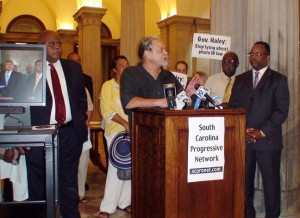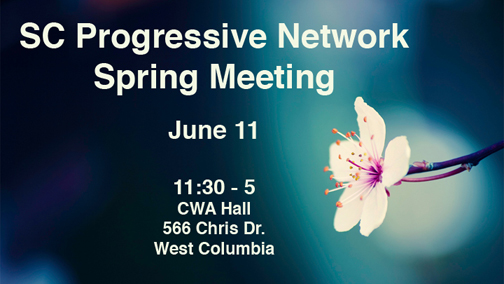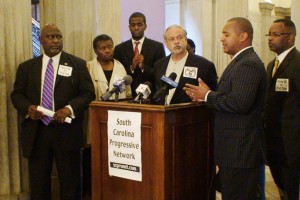By Becci Robbins
SC Progressive Network
You could forgive voters for being confused about South Carolina’s photo ID law. Debate on the bill went on so long their eyes glazed over years ago. It’s hard to be as charitable to Gov. Nikki Haley, who twists the truth every time she defends the law she helped push through.
The governor argues that if we need a photo ID to buy Sudafed or to board a plane, we should need one to vote. Sounds reasonable, but neither pharmacies nor airlines require a state-specific ID, as this law does. And to get a SC photo ID you need to produce a birth certificate. For some people, that’s a problem.
Finally, we are number one! Sadly, it’s in voter suppression.
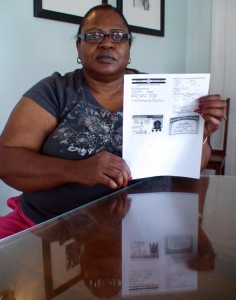
These documents aren’t enough for Delores Freelon to vote.
The National Conference of State Legislatures has identified seven states as having the most restrictive photo ID requirements for voting: Georgia, Kansas, Texas, Indiana, Wisconsin, Tennessee and South Carolina. All require voters to show a photo ID, but states vary in what kind and how hard it is to get.
- In Georgia, if voters are already registered, they automatically get a new photo ID voter registration card.
- In Kansas, voters can use a driver’s license from out of state, any accredited college ID, or government-issued public assistance cards. Voters over 65 may show expired ID.
- In Texas, you can get ID to vote with your concealed weapons permit, your boating license, insurance policy or beautician’s license. Or you can vote a provisional ballot if you will incur fees in order to vote. Voters over 70 are exempt.
- In Indiana, those without a photo ID get their provisional vote counted by claiming the fees to get the required documents were a burden.
- In Wisconsin, voters can use any state driver’s license, Social Security card or student ID.
- In Tennessee, a driver’s license from any state allows you to vote.
- In South Carolina, voters must produce a birth certificate to get the state-issued photo ID required to vote. No exceptions. (If you vote a provisional ballot, that won’t count unless you present your state-issued photo ID within three days.)
Numbers are hard to project, but it is clear that some of the nearly 200,000 registered South Carolina voters who don’t have their papers in order will not be able to vote in the next election.
Even though there are no cases of the kind of fraud this law is purported to prevent, our cash-strapped state will spend at least the $700,000 supporters say it will cost to implement. Opponents say it will cost two to three times that much to educate poll workers and the public about the new law. The governor has said you can’t put a price on the sanctity of the vote.
She should tell that to Delores Freelon, a Columbia resident and registered voter who won’t be able to vote in the next election because she has a Louisiana driver’s license and can’t get her birth certificate from California in time. What about the sanctity of her vote? What about Ms. Kennedy in Sumter, whose birth certificate lists her first name as Baby Girl, meaning she’ll have to go to court to get her papers straight in order to get a photo ID? Or Larrie Butler, who was born at home in Calhoun County in 1926 and is being told he needs records from an elementary school that no longer exists in order to establish a birth certificate?
Stories like these are coming in from around the state. The SC Progressive Network, which for 15 years has been advocating for voting rights, is fielding calls from people with questions about the new law or having problems meeting the ID requirements.
The lucky ones will still get to vote, but only after jumping through hoops and paying fees at various state agencies. Some will have to amend their birth certificates by going to court, at considerable cost. People without a car, a computer or short on money are simply out of luck. The disenfranchised will be primarily seniors and the poor. Many of them will be people of color who have voted all their lives.
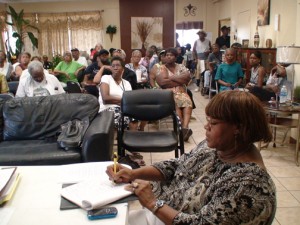 The Network is working to educate the public about the new law.
The Network is working to educate the public about the new law.
This quiet whittling away of the vote is no accident. It is, in fact, the point. It’s the pattern being repeated in GOP-controlled legislatures across the country.
In South Carolina, we have a brief chance to challenge this law. Because of our state’s history of disenfranchising people of color, ours is one of seven states that must get pre-clearance from the US Dept. of Justice (DOJ) before new voting laws can go into effect. Once the state attorney general files the case, DOJ has up to 60 days to consider whether the law suppresses the minority vote.
The SC Progressive Network is gathering statements to forward to DOJ documenting voters’ experiences. We need volunteers around the state to help find citizens who will have a hard time meeting the new voting requirements. If you want to help, call the Network at 803-808-3384 or see scpronet.com for details.
See video clips of Delores Freelon and Larrie Butler telling their stories.

